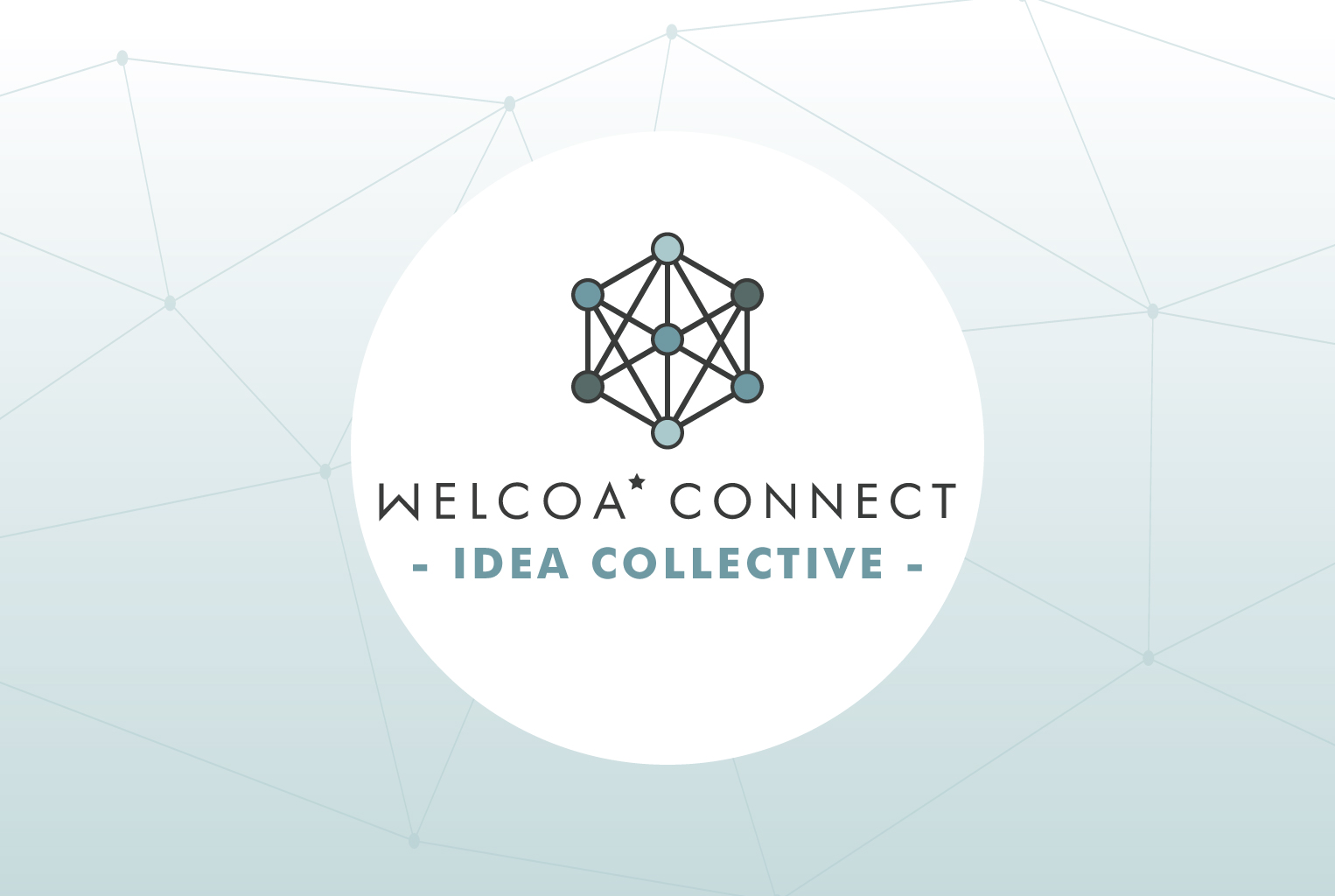During the COVID-19 pandemic, people spent a lot of time isolated and indoors, which helped foster an environment where some people now feel lonelier than ever. The result is a loss of social connectedness—the degree to which people feel the social connections and relationships in their lives to satisfy their wants and needs. When social…
Your Welcoa membership has expired.
Reflecting Back On WELCOA Connect Idea Collective: The Future of Work & Social Connection
Over the past five weeks, WELCOA brought together 15 incredible subject matter experts to create conversations around the future of work and social connection. During a time of division in the world, whether from the global pandemic, racial injustice, or opposing political views, the need for connection is vital, more now than ever. The result of this Idea Collective has been awe-inspiring.
Week 1 | The Importance of Social Connection: Why it Matters in the Workplace
According to an Idea Collective attendee, speakers Jeff Jernigan, PHD, BCPPC, FAIS, Howard Ross, and Sara Martin, MS presented a great mix of “philosophical discussion and practical application.” Here were the key takeaways from participants from week one:
- The need for social connection is greater than we realized pre-COVID and it will require some creativity for employers to create new opportunities for employees and teams to connect.
- Inclusion, acceptance, empathy and appreciation are key pieces to connection in the workplace.
- To remember when working on messaging to employees, consider who is receiving the message and not only what message we want to get across. This concept is called receiver-oriented communication and is defined as communication, which takes account of receiver factors and makes allowances for their frame of reference.
- Social isolation affects the brain the same way that physical pain does.
- There is a need to create an environment at work that allows for authentic relationships to develop and for organic growth.
- Healthy, meaningful relationships are important for our ability to be resilient to stress.
Following the first virtual Idea Collective, we kicked off the Connect Fireside Chats that same week. While the Idea Collective was thought-provoking, the Fireside Chats were moving. Participants connected not only with each subject matter expert on a more personal level, but also with each other. The camaraderie, idea-sharing, and thought leadership in these groups was inspirational and heartwarming.
Week 2 | The New World of Wellness at Work
In week two, concept met reality as experts Jen Arnold, MS, RD, LDN, Cassie Buckroyd, and Laura Putnam, MA shared experiences and strategies around workplace wellness programs while navigating these challenging times. Here were the key takeaways from participants:
- Think of a wellness program from the employees’ perspective and challenges they are facing.
- Look outside the box for solutions and view things from different perspectives.
- Plan ahead on a shorter timeline and be agile and open to change.
- Be gracious with yourself and others.
- Use the stop, start, continue framework as a guide when making program changes.
- Study the cultural ‘current’ within your organization to best navigate the currents that are helping or hindering individuals in being the best self.
- Take this opportunity to re-frame the discussion around workplace well-being.
- Many professionals tasked with workplace well-being feel like the ‘lone wolf’ but we are not alone, we have each other to collaborate with and learn from.
The second week of Fireside Chats continued the trend from the first week with deeper connections and collaboration happening organically. It was inspiring to be present during the idea-sharing in the chat pane, as well as incredible conversations.
Week 3 | Mental & Emotional Health Around Social Connection in the Workplace
Stella Grizont, Ilana Shapiro Yahdav, MPA, ACGRS, and Mettie Spiess, CWP, CPHSA focused on topics of grief, stigma-free connection, psychological safety, suicide, and authentic conversations to help boost employee positivity, resilience, and engagement. While the conversations sometimes felt heavy, the connection was palpable within the group. Thought leaders were connecting not only on a shared topic, but also as people. Participants shared these key takeaways:- The statistics on suicide versus other workplace injuries was eye-opening. It is important for us to continue to promote suicide awareness and training in our work environments.
- Grief can happen from both positive and negative situations and affect everybody differently. It does affect everybody and impacts the ability of employees to be productive.
- It is okay to not be okay and we need to remember that and allow employees that same consideration.
- Making sure that leaders in our organizations have the tools and training to help them have difficult conversations is important.
- Sometimes, people just need somebody to listen. Be a heart with ears.
- The importance of providing a safe space and allowing employees to share without fear of judgement or retaliation of any sort.
Week three of the Fireside Chats was nothing short of amazing. Looking back, this is the week that this group of individuals connected on a level that was akin to family. Personal stories were shared, tears were shed, support was given and this group of people that were strangers just a few short weeks ago were now lifting each other up and hugging each other virtually.
Week 4 | Systems & Structure Around Social Connection in the Workplace
Experts Jason Lauritsen, Jennifer S. Pitts, and Dr. Somava Saha shared knowledge around building connection into the framework of organizations and what infrastructure for more holistic well-being looks like. Here were the key takeaways from participants:- Foster connection by weaving it in to the existing routine/culture of the organization. Don’t simply add new programming to solve for a problem.
- Create opportunities for encouraging compassion and relationship building.
- The escalator analogy was very helpful in understanding the concept of inequities, privileges, and struggles. Also, the importance of helping those that are trying to go up the down escalator.
- The solution to employee engagement lies within understanding relationships.
- The three insights to connection; overlap, meaningful activity, and time were very helpful and applicable for all relationships.
- Use the 3H check-in (Head, Heart, Health).
- Combining the well-being of people and places with equitable policies and systems to create the overall well-being of a business.
Week 5 | Evaluation & Iteration Around Social Connection in the Workplace
Leigh McCormack, Mari Ryan, and Michelle Spehr wrapped up the series with data and tools to evaluate the strategies we put in place. Participants shared these key takeaways:
- The importance of measuring what matters for the organization. If we aren’t going to use the information gathered, why measure it?
- Look beyond HR metrics with the addition of qualitative data.
- Use design thinking methods.
- Start with why and create meaningful conversations around it.
- Include the entire organization including other departments when collecting overall collection of data.
- Using data effectively enhances wellness programs.
The Fireside Chat sessions brought everyone closer in a virtual setting by offering inspiring activities and poll questionnaires. This is a group that everyone came to appreciate so much and exceeded expectations. It was absolutely fascinating observing attendees as they gained knowledge about the topics while learning more about themselves. This group also connected with the WELCOA team in a way they hadn’t before and experienced an inside glimpse of some of the strategies WELCOA uses to make the workplace whole again starting with the human.
The success of the Idea Collective and Connect Fireside Chats has created even more excitement around the WELCOA Connect Inner Circle. Together we are making amazing things happen!

Lori Thomas // Member Education Manager & WELCOA Connect Project Lead • WELCOA
Lori brings a unique level of expertise and perspective with a diverse background in wellness, workplace culture, and employee experience. She is a compassionate and driven woman who has a passion for helping others and radiates positivity. As WELCOA’s Member Education Manager, she provides creative insight to enhancing the member experience.




